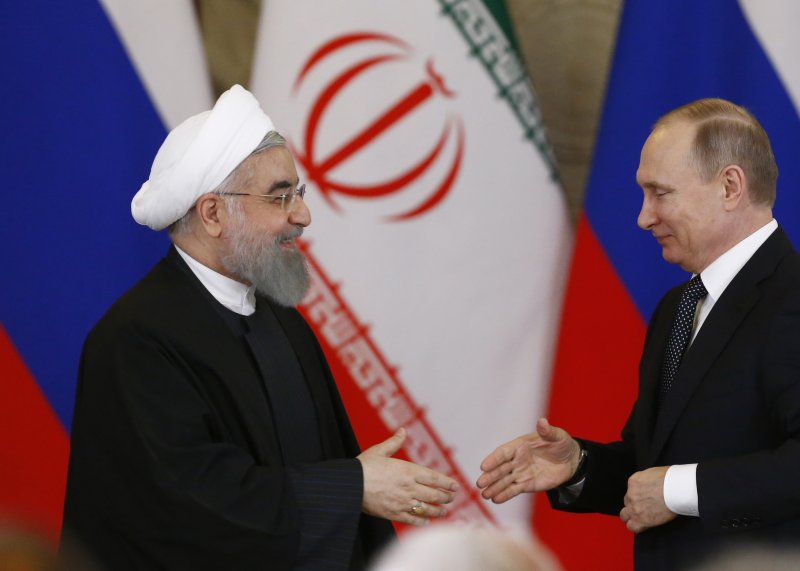Russian President Vladimir Putin (R) shakes hands with Iranian President Hassan Rouhani during a joint news conference after their talks at the Kremlin in Moscow on March 28. Pool Photo by Sergei Karpukhin/EPA
April 17 (UPI) -- Moscow acquired great influence in the Middle East during the Cold War, lost it afterward under former President Boris Yeltsin in the 1990s but has regained it under Vladimir Putin, especially in recent years. Indeed, the level of Russian influence in the Middle East appears to exceed that which the Soviet Union enjoyed.
During the Cold War, Moscow and Washington largely had separate sets of allies in the Middle East. Sometimes a country would switch from allying with one of them to allying with the other, such as when Gamal Abdel Nasser reoriented Cairo from the West toward Moscow in the 1950s and when Anwar Sadat reoriented it away from the Soviet Union toward Washington in the 1970s.
Except for Kuwait and North Yemen, which cooperated with both Moscow and Washington, and revolutionary Iran, which cooperated with neither, governments in the Middle East tended to be either pro-Soviet or pro- American during the Cold War.
This is very different now. Under Putin as the Russian president, Moscow has good relations with almost all major actors in the Middle East — anti-American as well as pro-American Arab governments, Israel as well as Iran, Hamas as well as Fatah, and the Syrian Kurds as well as Turkey.
What is especially noteworthy is that Putin has managed to have good relations with several sets of Middle Eastern actors that are opposed to each other. This is especially remarkable in Syria where certain Gulf Arab countries and Israel are hostile toward Iran's presence but maintain friendly ties to Moscow despite its working closely with Tehran in Syria.
How has Putin managed to do this? Part of the answer is that he, unlike Washington, is willing to talk with everyone except al-Qaida and the Islamic State, which are hostile toward virtually everyone, including each other. More than talk, however, Putin is willing to assist opposing sides in various conflicts. Moscow, for example, cooperates with Iran in Syria and elsewhere even as it pursues economic cooperation with Iran's Gulf Arab rivals as well as security cooperation with Israel.
Why does each of these actors tolerate Moscow cooperating with its rivals? Fear that not doing so will result in Moscow siding even more with their rivals might be one motivating factor. The ability to get at least something from Moscow and show its rivals that Russia does not just support them completely may be another.
Whatever the actual reason, Putin has been able to balance among various Middle Eastern actors and maintain cooperation with them all.
Can Putin do this indefinitely? If one side in a conflict in which Moscow is balancing between both protagonists feels sufficiently threatened, that government might grow impatient with Russian aid to its opponent and look for greater support from Washington and other governments not backing its rival.
The downturn in Russian-Turkish relations that occurred after the November 2015 Turkish downing of a Russian military aircraft occurred in the context of Moscow and Ankara supporting opposite sides in the Syrian civil war. Although the Russian-Turkish relationship recovered a few months later, Putin might not always in other cases maintain his balancing act or recover from it so easily if it is lost. The possibility of conflict between Israel and Hezbollah (or even Iran) may be one such instance.
Moscow might avoid this problem through promoting conflict resolution between rivals with whom it seeks to maintain good relations. Indeed, it has advertised itself as being a better mediator than Washington because, unlike the United States, Russia talks with (almost) everyone.
Being able to talk to two sides to a dispute, however, does not give Russia the means to persuade or coerce them both into making the compromises needed to settle their dispute. Nor will Moscow be seen as a credible peacemaker in Syria if it cannot prevent the Assad regime from attacking its citizens with chemical weapons, as occurred recently.
Yet even if Russia cannot, or will not, serve as an effective mediator, Putin may succeed in avoiding any major blow up and continue to balance among Middle Eastern rivals. These Middle Eastern actors, in turn, can be expected to respond in kind by not fully allying with Russia but balancing between Moscow and its rivals as well.
This article originally appeared at The Arab Weekly.















